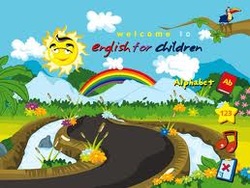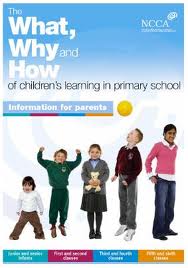English Language Learners
In Ireland the Department of Education refers to pupils who are learning English for the first time as English as an Additional Language (E.A.L.) learners.
How are E.A.L. learners supported in Powerstown ETNS?
English as an Additional Language learners are supported in three ways in Powerstown ETNS:
1. Small class sizes
2. Class teachers strongly emphasise oral language and vocabulary development in all lessons
3. English as Additional Language (EAL)Team (click here for policy).
The Continuum of Support team provide school support for children whose first language is not English. Support may be provided in-class to individual children or groups of children or through withdrawal to the Support Room of groups of children.
The support teacher compliments the being done in class through teaching and reinforcing language around a variety of cross-curricular themes: Each class has a different monthly theme which is shared with parents.
Support teachers also support basic language acquisition under the following headings:
Myself
Our School
Food and Clothes
Colours, shapes and opposites
People who help us
Weather
Transport and travel
Seasons, holidays and festivals
The local and wider community
Time
People and places in other areas
Animals and plants
Caring for my locality
If your child is withdrawn for language support they will be on a specific school support plan which teachers will discuss with you.
———————————————————————————————————————-
Children who find themselves in a whole new world of meaningless words, will often take some time to adjust. The typical stages are:
1) Continuing to speak in their own language
2) Not talking at all
Younger children tend to remain silent longer than older children but there is no standard time frame for it. A silent period is common in language learning and does not necessarily mean there is a learning problem. It is important to remember that although the child may not talk they are still learning and when children emerge from the silent period they demonstrate the learning that has taken place.
Tips for parents
Here are some tips to help you help your child in their learning of the English language.
 |
1. Speak to your child in your native/mother tongue.
Your child will learn English much more effectively if they continue to develop their first language at the same time. Every month we will have a Language of the Month and if your native language comes up we would really appreciate your help so if you could come in and read a story in your language or teach us a few words that would be great! |
| 2. Ask your child about what they are learning and doing in school.
In doing this you will learn the words that are important in your child’s school life. Every month we will introduce a new theme so if you could also talk to your child about this theme, animals for example it would greatly benefit their learning.
Check your child’s monthly theme under the “Curriculum” page on the school website. (Click here)
|
|
 |
3. Read Regularly
Reading is an invaluable skill that only improves with practice. Parents can help by providing access to books and reading aloud to their children. While it’s important to practice reading in English, not every book must be in English. Reading in their native language can help students preserve their culture while also improving their overall reading fluency. Students who read well in another language are more likely to experience success in English literacy. |
| 4. Communicate with Teachers
Talking to teachers and other school personnel may feel daunting for parents, especially if you are not comfortable with your own English skills. Teachers frequently interact with adults who are learning English and google translate or staff/parent/friends can translate are very helpful resources! Teachers can be invaluable partners in helping your children reach their full potential. In addition to reporting on a student’s overall progress, teachers may be able to suggest the best methods for practicing English at home and point you to helpful resources. |
|
 |
5. Model Learning
One of the greatest ways for parents to help their children learn English is by attempting to learn English themselves. When parents are able to use English at home, more opportunities will arise for children to practice speaking and listening. Parents and children practicing their new skills together can be a great motivator. Even parents who are fluent in English can demonstrate the importance of learning by focusing on an area of improvement, such as studying a difficult novel to learn complex vocabulary or bettering their writing skills. The school will run FREE English classes for adults and/or have access to classes for parents. If you or anyone you know are interested in attending please let us know. Details of classes will be posted on noticeboard, website and sent home via the school app. |
And Lastly…6. Be patient. Understand that learning a language is a complex, long-term process. Learning in a new language also takes lots of energy so please ensure that your child gets plenty of rest. |







